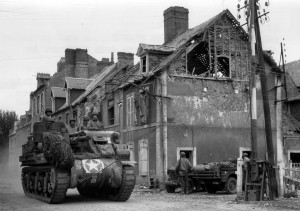
In the spring of 1940 a shadow began its descent on Europe. Hitler had commanded his armies to move into Poland in September, 1939. France and Great Britain had declared war on Germany to protect Poland’s freedom and national sovereignty. Ironically, they did little to aid the Poles. As the German armies rolled into Poland and struck fast and furiously, the British bombed German territory with pamphlets and the French invaded the town of Saarbrucken, only to retreat days later. As Poland collapsed, France, Britain and Germany settled into an uncomfortably quiet stalemate, nicknamed by one journalist, the “phony war”. For a time, between the fall of 1939 and the early spring of 1940, the phrase “all quiet on the Western Front” was quite literally true.
Then, as spring blossoms bloomed, Western Europe was introduced to the terror of the Nazi “blitzkrieg”. As Holland and Belgium succumbed to the power of the German Wehrmacht, a schizophrenic France and Britain tried to juggle two different wars: one in France and the other in Norway. They lost both. By 1941, the German blitzkrieg turned East, invading Yugoslavia, Greece and the Soviet Union. The German war machine had mastered mobile warfare and it seemed invincible. But, as we know now, one thing that beats blitzkrieg is snow and mud. The Soviet Union was holding on by a thread and the weather was an invaluable ally. Yet, despite the efforts of “General Mud and General Winter”, they urged their true allies, Great Britain and the United States, to open a “second front” to divert the Germans’ resources. The plan to invade France was made.
The Americans and British had already driven the Germans and the Vichy French ( Vichy France was a Nazi-sympathetic semi-independent puppet state in Southern France) out of North Africa. They had invaded Italy and were inching their way up the peninsula.
On June 6, 1944, the largest amphibious invasion in history commenced. The armies of the United States, Great Britain and Canada hit the beaches of Normandy. At their side were Free French fighters, exiled Polish soldiers and myriads of other miscellaneous Allied troops. Once the Allied armies had succeeded in landing on the beaches and holding a beachhead, the invasion of France began. The Allies defeated the Germans at the decisive battle of the Falaise Pocket and a breakthrough occurred. General George Patton’s tank army broke through the German lines and within weeks, overran France. The German army was in retreat and did not make a sufficient counterattack until the Battle of the Bulge in the winter.
Patton’s breakout from Normandy was legendary and the term that had been used to describe the terror of an overwhelming enemy attack was modified to describe the power of the American tank and the unbelievably rapid American advance. The American Blitzkrieg was born.
Why was the breakout from France in 1944 an epic American battle? Why not? The American Blitzkrieg was an amazing victory for the United States and for the Allies in general. Paris was liberated and the tide of the European theater of World War II was turned.
